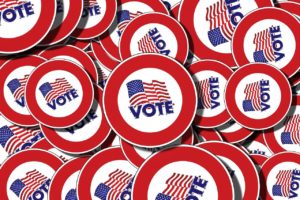
Vice President Kamala Harris (D) and former President Donald Trump (R) are locked in a tight presidential contest in Virginia, according to a new statewide survey from the Center for Leadership and Media Studies at the University of Mary Washington.
Harris has the support of 47 percent of 756 Virginia likely voters, as compared to 46 percent favoring Trump in the survey, which includes 1,000 adult respondents and was conducted for UMW’s Center for Leadership and Media Studies by Research America Inc. Sept. 3-9. Several third party and independent candidates received a total of four percent support in the poll, while the remaining likely voters said they were undecided.
In a question that asked likely voters only about the major party nominees, the results also remained well within the margin of error: 48 percent favored Harris and 46 preferred Trump.
Among all survey respondents, the two major party nominees were tied at 44 percent each. Roughly five percent said they were undecided, with the remainder saying they support a third-party or independent candidate or were not planning to vote.
“This new survey suggests Virginia should be getting a much closer look from both presidential campaigns,” said Stephen J. Farnsworth, professor of political science at the University of Mary Washington and director of UMW’s Center for Leadership and Media Studies. “Virginia may deserve to be treated as a ‘swing state’ once again this year.”
The survey, which concluded just before the presidential debate on Sept. 10, showed that Virginians were greatly concerned with a range of policy issues: 20 percent said the economy and jobs were the top concern, while 19 percent said inflation, 19 percent said threats to democracy, 13 percent said immigration and five percent said abortion. Republicans in the survey focused more on economic matters, while Democrats were more likely to be concerned about threats to democracy and abortion.
Farnsworth noted that some Virginia surveys conducted in the weeks since Biden decided not to run for re-election have offered differing results. Some found a margin favoring Harris that was greater than the survey’s margin of error, while others identified a very close presidential contest in Virginia.
“Given the range of findings in Virginia surveys over the past two months, the Harris and Trump campaigns may be paying far too little attention to the Commonwealth,” Farnsworth said. “Virginians have a history of bouncing back and forth between the parties.”
Four years ago, former Vice President Biden (D) defeated Trump by a 10-point margin in Virginia. A year later, Republican Glenn Youngkin was elected governor by a 51 percent to 49 percent margin, Farnsworth said.
Virginians in this new survey said they approved of Gov. Youngkin’s job performance by a 46 percent to 34 percent margin. As for President Biden’s job performance, 37 percent of survey respondents approved and 53 percent disapproved.
There is little evidence of partisan defections in the current presidential contest, with roughly 90 percent of partisans backing their own party’s nominee. Virginians who said they were political independents were split roughly evenly between Trump and Harris.
In the two-candidate contest for Virginia’s U.S. Senate seat, 49 percent of likely voters said they would favor Tim Kaine, the Democratic incumbent, and 43 percent support Hung Cao, the Republican challenger, with the rest undecided. In the entire 1,000-person sample, 45 percent favored Kaine and 38 percent backed Cao. The remainder were undecided.
Early voting in Virginia began on Friday, Sept. 20.
For further information, contact Professor Farnsworth at sfarnswo@umw.edu.
For more survey results, see Topline, All Survey Results and Likely Voter Results.
SURVEY INFORMATION